6 Things That Surprised Me About Going to A Korean Church
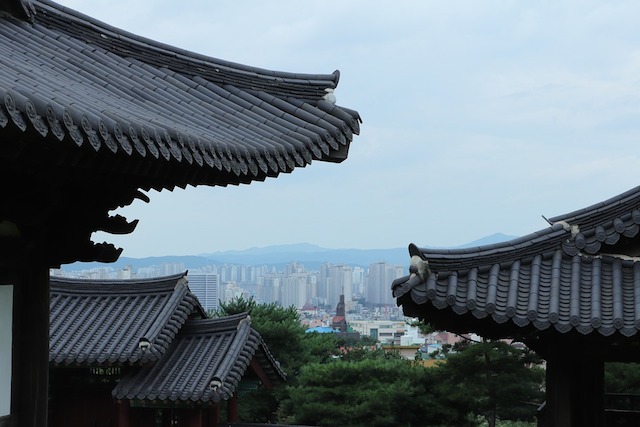
On our way to an English speech competition, my Korean co-worker asked me if I went to morning prayers at the local Korean Presbyterian Church. I said no, I usually attended on Sunday mornings and afternoons, and that was it. She was surprised and probably thought I lacked devotion. Each morning, my Korean co-teacher woke up before 5 a.m., went to morning prayers, and then came to work. I did well to get up on Sunday mornings for a few hours once a week.
Personally, attendance at a Christian church has always been part of my life, and when I moved to Korea as a Fulbright English Teaching Assistant, I wanted to continue the habit. However, churches in Korea and the United States are very different in practice and demographics.
I was blessed to be a part of my local Presbyterian church, and it was in the Korean church that I understood what it meant to be a different culture.
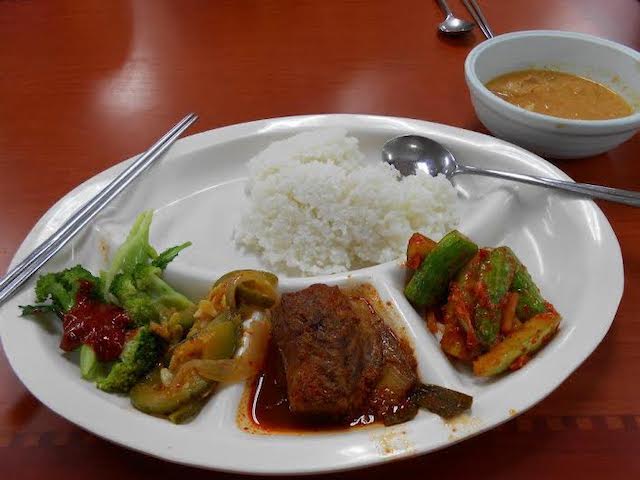
- A church meal in South Korea.
There were six distinct practices or habits of attending a Korean church that surprised and delighted me all at the same time.
6 Things That Surprised Me About Going to A Korean Church
1. Age and Family Dynamic
In Korean churches, there are small children and the elderly. Of course, there are a few middle aged adults and teenagers, but overall, these are the two age groups you will see in a Korean church. Perhaps it’s the demanding work hours or a disinterest in religion that keeps older teens, young adults, and middle agers out of church, but the age difference was noticeable. Also, you will rarely see full families in the pews like in the United States. It’s not unusual to sit in a pew full of older Korean women attending services alone.
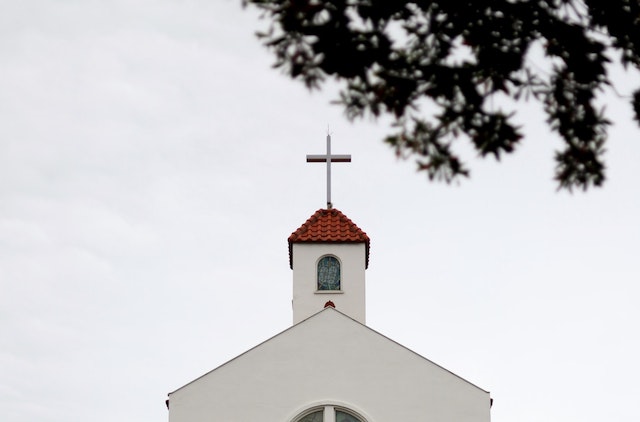
2. Stand up, Stand up for Jesus!
In American churches, we like to make visitors feel welcome, but we usually don’t want to single the visitor out. This American notion was thrown out the window when I visited my home congregation on Jeju Island. My first Sunday, the pastor asked me to stand up, wave, and introduce myself to the whole congregation.
Everyone nodded and applauded politely. However, it wasn’t just for me. Any visitor was asked to stand and introduce him or herself. This is very common in Korean churches, regardless of denomination.
3. All-day services
Sundays are an all-day affair for many Korean Christians. A morning services may begin at 6 a.m., followed by Sunday school, followed by yet another repeat service. Several hours later, at about 2p.m., it’s time for the afternoon service. Typically, I attended Sunday school and late morning services. It’s not unusual for a whole congregation to stay from late morning to late afternoon on a Sunday.
4. Morning Prayers
Almost every Korean church (even those in the United States) host morning prayers like those that my co-worker attended. These are usually an hour before the work day begins, and not surprisingly, it’s a practice many Korean Christians hold dearly.
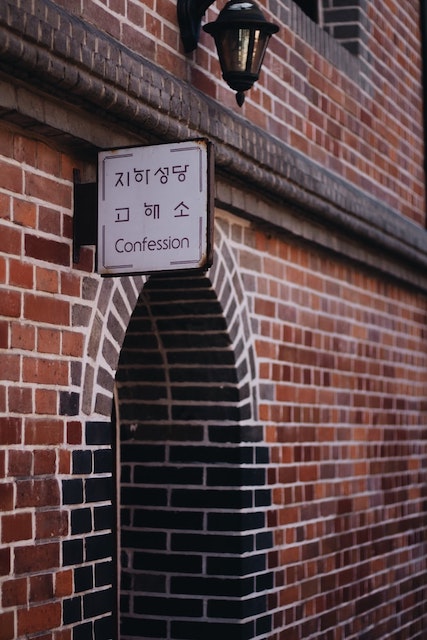
5. Weekly Meals
A visit to a Korean church is not complete without after-service lunch. This usually occurs between the late morning service and the afternoon services. Dishes are simple: usually cold noodles and kimchi, but it’s delicious and something that happens every week! At my home church, meals after services occur on special occasions.
I assumed the same of my Korean church until I witnessed it every Sunday during my time here. Some of the best meals were eaten after church services during my time in Korea.
6 Things That Surprised Me About Going to A Korean Church.
6. “Are you saved?”
Korean Christians are open and proud of their faith. It’s not unusual for a Christian coworker to ask about your religious beliefs as a casual piece of conversation. This is the same inside the walls of the church. During the end of my time in Korea, an associate pastor asked through my friend (and translator) if I was baptized and knew Jesus as my personal savior. They even gave me a copy of the Korean Presbyterian Catechism.
Most people may be frustrated with personal questions, but I appreciated the gesture. Regardless of our cultural boundaries, I knew someone was looking out for me.
If you’re a practicing Christian, or you’re curious, I would encourage you to visit a Korean-speaking church if you find yourself in Korea. Though the practices are very different, you’ll find that Korean Christians are some of the most fervent and welcoming believers on the planet. Just make sure you come with an empty stomach and speak loud and clear when you stand up to introduce yourself.
6 Things That Surprised Me About Going to A Korean Church
Related Reading
So Much Culture Shock in South Korea
South Korea Travel Tips: Rebecca’s Take on Health, Safety and Romance
Travel South Korea: A Conversation with Rebecca Biage
Losing My Way and Finding Myself in Seoul
Finding Balance and Self-Acceptance in South Korea
Beware of This When Learning Korean
Have you traveled to South Korea? What were your impressions? Email us at [email protected] for information about sharing your experience and advice with the Pink Pangea community. We can’t wait to hear from you. Top photo credit by Pixabay.




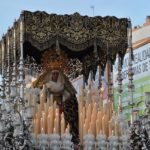




So many Koreans loves Jesus Christ and this is a real Testimony to see that South Korea is shining. It is amazing grace.
thank you all who have shared the experience from Korea.i would like to have direct contact from any person who is or who was in Korea and he or she attended Christianity services or worship.
I really appreciate your sharing of your experience in Korea. I am a Korean American, and have been teaching at a Korean Christian schoool for the past ten years. Although I understand your “surprises” you have encountered here in Korea, I think there is some over-generalization both in your article and in the responses below. I can only speak for my church, and I grant that my church may not be the norm, and what you have experienced may be more common.
About demographic, the major part of our congregation is between the age of 30 and 60, and elders may comprise only about 10 %. And teens and young adults would make up about 25% of the church, so i believe the church is well -balanced demographically.
But more importantly, the commentor below has said that the Korean churches have “damaged the real power of the Kingdom” and they have “blocked those who tried to really enter.” I feel sorry that this person feels this way, and I am sure there is a legitimate reason for saying this, and although there may be some truth to this because of some overly enthusiastic and wrongfully directed pastors, but this, in general, is simply not true. There are so many believers and pastors who genuinely love the Lord, and who have experienced the power of the freedom that the gospel offers. People are not offering their life to God out of some legalistic duty but out of pure gratitude and love for Jesus, and to say as if all Korean churches are bent toward legalistic and judgmental way of thinking is simply not correct. My church, just like other Korean churches holds daily morning prayers M-F. (No weekends because of late night Friday and Saturday small group meetings at homes) However, these morning prayers are only recommended for vibrant daily fellowship with the Lord, and it is not viewed as the only way to have fellowship with the Lord. If you can have your daily quiet times with the Lord at a different time and setting, well..go right ahead. What’s important is that you have that special time with the Lord. This is never viewed as a standard to judge someone.
One last comment about asking someone “Are you saved?” My church does not do this to our newcomers by the way. But my thought is that if you are saved person and you are aware of it, I don’t think you will feel offended by this asking because as a saved person you understand how important this question is. Who knows? This encounter may be the last time he/she will be asked this etenal question. So, because this person understands the importance he/she won’t be offended, and if this person is a non-believer, he/she definitely needs to hear this question and really ponder about it. Of course, this question should never be asked in a condescending way, but in a genuine concern. And I do realize that even if you ask this in a genuine and polite way the person may feel offended or at least awkward, but to say the church is blocking any person from heaven is too-far of a stretch.
Koreans have also damaged the real power of the Kingdom by their enthusiasm and into religion type of phenomenon run by human beings, which can not save in times of real trouble.
Just like in Jesus’s time, there were Bible teachers and fervent believers, they only added up to sending more to hell, blocked those who tried to really enter. No different than here. They bring down those who do not come to their morning meetings, and emphasize on ‘saved’ or ‘not saved’ and try to convince this kind of feeling into their consciousness, as if this is kind of a mark or ticket to heaven and a good Christian. The bible in its entirety goes beyond that, so only those who seek narrow path actually know what this is all about, never intended to be this way from heaven.
Great insights! Korean Christians can be quite upfront with their inquiries but like you said, they’re very hospitable and welcoming. And I agree that morning prayer in Korean churches are used sometimes as a litmus test for devotion. Koreans are very proud of the early dawn prayer movement but I overheard that some pastors and attendees experience chronic health problems from not getting enough rest.